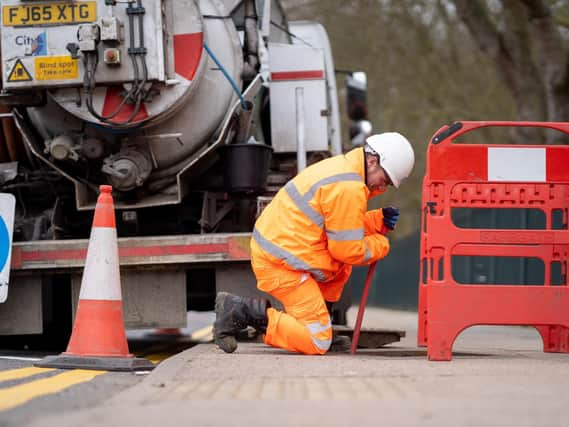10km of Aylesbury sewers cleaned in record-breaking programme


The underground pipes, stretching the equivalent of a fifth of the Aylesbury Ring, have been swept since April last year using a range of techniques, from hi-tech camera technology as part of the company’s digital revolution to hand tools on the most stubborn blockages.
The work was part of a record cleaning programme across the Thames Valley and London, which saw 1,500km of sewers inspected and cleared to ensure they can safely take away the wastewater of millions of customers without being blocked by obstacles like fatbergs.
Advertisement
Hide AdAdvertisement
Hide AdWorking with partners including Lanes Group, McAllister Group and OnSite, and despite the disruption caused by the coronavirus pandemic, Thames Water’s huge haul included a record-breaking 190km in February alone.
The water company has now set an ambitious target of 2,300km next year, the equivalent of a sewer stretching from London to Athens, with almost 16km of sewers in Aylesbury due to be cleared by the end of 2021.
Matt Rimmer, Thames Water’s head of waste networks, said: “Despite not being the most glamorous job, battling fatbergs and other blockages in our sewers is absolutely vital in ensuring we’re able to safely take away the waste of our millions of customers.
“Once again we’ve carried out a record amount of cleaning this year but we aren’t stopping there and have ambitious plans to go even further to keep our sewers flowing as smoothly as possible to help protect our customers and the environment.
Advertisement
Hide AdAdvertisement
Hide Ad“Sewers can be unpleasant places and some of the things we find in our pipes highlight just how important it is to ensure nothing gets in there that shouldn’t. We urge all our customers to only flush the three Ps – pee, poo and toilet paper – as well as binning fats and oils rather than pouring them down the sink.”
The vital work included using high powered water jets to blast away blockages and powerful vacuums to suck them out.
Engineers even had to use hand tools to break down some of the more steadfast blockages and carried out extensive surveying of the sewers, including using remote cameras attached to small floating barges, to help identify any blockages or defects.
Areas where sewers were cleaned have seen internal flooding and pollutions halve in the last year, while emergency blockage clearances went down by almost one-third.
Advertisement
Hide AdAdvertisement
Hide AdNext year’s programme will see engineers clean an average of 192km of sewers every month, equivalent to the distance from London to Newport in Wales.
Kirsty James, planned maintenance delivery manager for Lanes, has been shortlisted for Woman of the Year in the Water Industry Awards 2021 after improving working practices during the programme. This included changing shift patterns, improving data use, a dedicated recruitment and training programme, and team and individual awards for hitting targets.
She said: “We can’t wait to get started on the new 12-month programme. Every year, we enter unchartered territory in terms of the effort needed to achieve target but we’re very motivated to succeed.
“This is an integrated team effort that’s delivering fantastic results for customers.”
Advertisement
Hide AdAdvertisement
Hide AdThames Water cleared a total of 900km of sewers in 2019/20, a 50% increase on the previous year’s total and three times higher than in 2017/18.
Thames Water’s annual ‘Bin it - don’t block it’ campaign offers guidance to customers on ways to avoid causing sewer blockages and tips on safely disposing of fats and oils or toiletries.